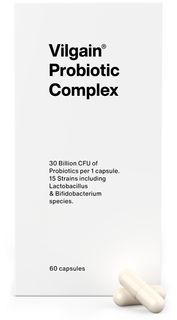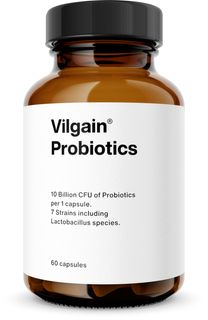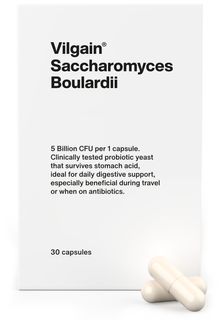
What are probiotics, prebiotics and synbiotics?
Probiotics are health‑promoting living microorganisms that occur naturally in our bodies, especially in the gut, where they are part of microflora. The most well‑known probiotic cultures are lactobacilli, which break down lactose and other sugars, and bifidobacteria, which positively affect our natural defences.
Prebiotics are the hard‑to‑digest part of foods that largely serve as fuel for probiotic cultures. The intake of prebiotics is thus central to the proper growth and activity of probiotic cultures.
The combination of probiotics and prebiotics results in so‑called synbiotics. In terms of benefit, the use of synbiotics appears to be more effective compared to probiotics and prebiotics alone. This group also includes our Vilgain Probiotics.
- Read more in the article Probiotics, prebiotics and synbiotics, how to find out?
When to take probiotics and synbiotics?
Probiotics or synbiotics can be used both preventively and as an adjunct to treatment. Their use is most often recommended during:
- taking antibiotics that disrupt the gut microbiome,
- digestive problems,
- inflammatory and autoimmune bowel diseases (e.g. Crohn's disease),
- a weakened immune system, or
- pregnancy and breastfeeding.
Probiotics can also be used as a preventive measure when travelling abroad, when the intestinal microflora often changes, which can result in so‑called traveller's diarrhoea. Probiotics are also becoming popular with vegans who do not consume foods rich in probiotics and prebiotics, such as dairy products.
Long‑term use of probiotics
Probiotics do not only address acute problems. Long‑term use of probiotics stimulates the natural defences, reduces the risk of the digestive tract being colonised by invasive strains of bacteria that cause diseases affecting the digestive tract, and contributes to overall inner well‑being.
Probiotics and prebiotics in food
In addition to the use of synbiotics or probiotic supplements, the intestinal microflora can also be cared for as part of a normal diet. Simply include foods that are rich in probiotics and prebiotics.
The most well‑known probiotic‑rich food groups include yoghurt, kefir, acidophilus milk or buttermilk. Then there are bryndza, emmental, mould and other ripened cheeses. Of the 'non‑dairy' sources, it is worth mentioning in particular fermented vegetables (sauerkraut, fermented cucumbers, Korean kimchi or Japanese natto), apple cider vinegar or kombucha.
One of the best prebiotics is considered to be inulin, a soluble fibre of plant origin. It occurs naturally in chicory (e.g. in the form of chicory syrup), Jerusalem artichokes, garlic, onions or asparagus. Prebiotic substances can also be obtained from eating fruit, vegetables or oatmeal.

